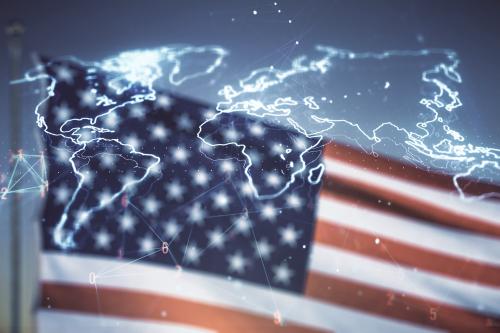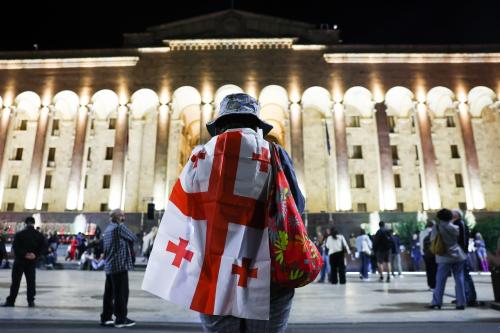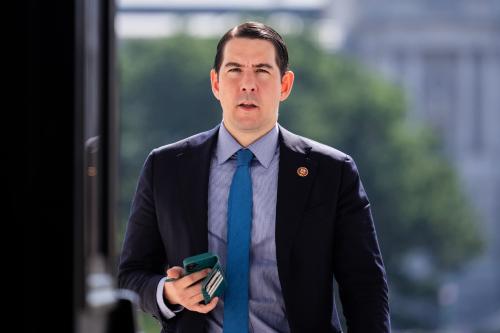The process of removing legislative immunity from prosecution for National Assembly member María Corina Machado, the 46-year-old leader of the more activist wing of Venezuela’s opposition, began on March 18. In an emergency session, her fellow legislators voted to remove her immunity and charged her with treason. Two days later she was on a plane to Washington to raise the alarm at the Organization of American States (OAS). Venezuela has become an authoritarian state with political repression, jailing and torture of opponents, reminiscent of the hemisphere’s “Dirty Wars” of the 1980s.
Machado’s colleague, Leopoldo López surrendered to the authorities on February 18 after leading a demonstration that called for the release of students and the respect for democracy. He is held in a military prison charged with incitement to violence, arson and damage to property; the first charge could result in a 10-year sentence. Students are arrested, beaten, raped and released to deter others. Nevertheless, students continue to demonstrate against the government of Nicolás Maduro. Doctors, housewives and union members have joined them. On March 22, hundreds gathered in towns all over Venezuela to protest the arrests of two mayors, one accused of not removing the opposition barricades with sufficient speed. Enzo Scarano could face 10 months in jail. Others demand the end of repression, scarcity of basic foods, over 50 percent inflation and violence by the National Guard and regime henchmen, the paramilitary colectivos. To date, the protests have resulted in 31 deaths, including National Guard members.
With strident political polarization throughout Venezuela’s towns, private production stalling to leave only one to two months inventory supplies and the economy deteriorating fast, the question arises as to who and how the spiraling violence can stop. President Maduro expresses the need for dialogue and has met with the leading producers and manufacturers in Venezuela. However, two weeks later he threatened and charged political opponents, most recently the mayors of San Cristobal and San Diego. In this climate, the opposition is wary of entering into dialogue and has raised their conditions for talks. These now include the removal of Cuban officers from the Venezuelan military. Consequently, prospects for dialogue between the government and political oppositions are dim.
Within Venezuela, people have suggested that the Catholic Church and maybe Pope Francis mediate. From within the region, former Brazilian president Lula da Silva and Uruguayan president Mujica have indicated willingness to act as brokers. Neither regional leader can be considered neutral, but either individually or as a group, they can be considered relatively honest brokers. So long as they are perceived as seeking the interests of a stable and democratic Venezuela that will work toward reconciliation, they can become acceptable.
However, for the immediate future, the opposition is more united than ever before, believing that they hold the moral high ground: thus, María Corina Machado’s attempt to speak on March 21 before the OAS. Her call for democracy and an end to repression is strengthened by the people she brings with her from Venezuela; an oil worker and union leader, the mother of a young woman slain by the National Guard as she stood on the sidelines of a demonstration one month ago and a student leader. There is nothing elitist about the three witnesses: as working class people, they should have been supporters of Chávez and his successor Maduro. Instead, they come to give personal testimonies before the OAS against the government at the risk of arrest upon their return home.
Without legislative immunity, Machado can only be prosecuted by the Supreme Court, a body which has gradually lost its judicial independence and now acquiesces to presidential requests. In addition to the charge of treason, she anticipates the same criminal charge as that brought against her colleague Leopoldo López, namely incitement to violence. Machado refuses to seek asylum abroad, but will return to Venezuela with the unbounded faith that democracy, the rule of law and respect for human rights will soon be regained. Meantime, she is ready to join 21 other political prisoners in Venezuela’s notorious jails. She knows the experience of Judge María Lourdes Afíuni who spent three and a half years in prison for releasing a businessman on procedural grounds after his pre-trial detention exceeded the constitutional limit. Machado is ready to suffer for her convictions, but we should broadcast her plight, seek the re-establishment of her legislative immunity from prosecution. Furthermore, if imprisoned, we should continue to argue for the release of this courageous woman.
The Brookings Institution is committed to quality, independence, and impact.
We are supported by a diverse array of funders. In line with our values and policies, each Brookings publication represents the sole views of its author(s).



Commentary
María Corina Machado Attempts to Bring the Venezuelan Opposition’s Case Before the OAS
March 24, 2014